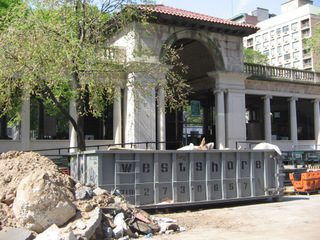
The City was forced to halt construction on the pavilion at Union Square Park in 2008. Photo: Jonathan Reingold.
Court found the agreement was a valid license and did not violate the public trust doctrine; Coalition hopes new Mayor will terminate license. In March 2012, the City signed a licensing agreement with Chef Driven Market, LLC, (Chef) authorizing Chef to open a 200-seat seasonal restaurant in the Union Square northern pavilion. The Union Square Park Community Coalition filed an article 63 petition seeking a preliminary injunction against the City from enforcing the licensing agreement. The Coalition won its petition in the lower court, but the Appellate Division ruled in favor of the planned restaurant in June 2013. On February 20, 2014, the New York State Court of Appeals affirmed the Appellate Division’s decision.
The Coalition alleged that the agreement violated the Public Trust Doctrine for two reasons: (1) it alienated “dedicated parkland for a non-park purpose without State legislative approval”; and (2) it was a lease, which is “per se an alienation of dedicated parkland” and required legislative approval, irrespective of whether or not it served a “park purpose.”
In deciding that the City did not violate the Public Trust Doctrine, the Court of Appeals relied on precedent from 795 Fifth Ave. Corp. v. City of New York (1965) that involved a challenge to a restaurant in Central Park. The Court in 795 Fifth Ave held that the Parks Commissioner is vested with “broad discretion to choose among alternative valid park purposes.” The Court reasoned that the Coalition “only showed a difference of opinion as to the best way to use the park space.” The Court decided that the Coalition’s claims were “similar to the ones found insufficient in 795 Fifth Ave.” The Court also decided that the Coalition did not demonstrate that the “type and location” of the proposed Union Square Restaurant was a non-park purpose and, thus, not unlawful. The Court therefore found that the agreement does not violate the public trust doctrine for a lack of a park purpose.
With regard to the Coalition’s second claim, the Court of Appeals held that the agreement was a license rather than a lease, which does not violate the public trust doctrine. A license is a revocable privilege to do one or more acts of a temporary nature upon such lands. A lease would go further and grant the exclusive right to use and occupy the land as they wished. The Parks Department retained significant control over the daily operations of the restaurant including hours of operation, staffing plans, menus, prices and only allows for seasonal use not exclusive use. The agreement also provides a broad termination clause allowing the City to cancel at any time, in good faith which is more indicative of a license as opposed to a lease.
Geoffrey Croft, of the Union Square Park Community Coalition, commented, “the proposed restaurant would take away desperately needed play space from children and the community as well as impact the pavilion’s free speech uses. We sincerely hope the mayor will make the right decision and return the historic pavilion to the children and the community instead of allowing an irresponsible Bloomberg-era high end restaurant to be built which is clearly not needed.”
NY State Assembly Member Richard Gottfried noted that “as the Court of Appeals acknowledged, the Parks Department has the authority to terminate the license between the City and this high-end restaurant. The area around Union Square Park has the least amount of playground space and the highest concentration of restaurants in the city and it is therefore terrible public policy to transform municipal parkland into a commercial use. Our parks should not be for sale.”
The new administration has not commented on the Court of Appeals decision or their plans on whether to honor this licensing agreement made under the Bloomberg administration. Mayor Bill DeBlasio has yet to appoint a new Parks Commissioner.
Union Square Park Community Coalition, Inc. v. Dep’t of Parks and Recreation, February 20, 2014, NYS Court of Appeals (Graffeo, J.).
By: Brian J. Kaszuba (Brian is the Managing CityLand Editor and New York Law School Class of 2004).

